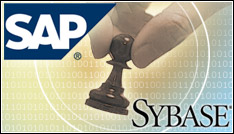German software giant SAP has agreed to buy data management company Sybase for £3.9 billion ($5.8bn) but analysts are scratching their heads over the deal.
Most people see a strong positive for SAP in owning Sybase’s mobile technology, an area where Sybase has made leaps and bounds in recent years, as it’s original flagship product – the Sybase database – has lost ground in the market.
Sybase isn’t setting the world on fire
Delivering data to mobile devices is going to be very important, and represents a good opportunity. However, the high price SAP has paid appears to factor in a big value for its database as part of the cloud offerings that SAP is putting together, and this aspect of the deal is raising analyst eyebrows: “This seems a horrendous amount of money to pay, to gain control of something that is hidden from the vast majority of users,” said Clive Longbottom of QuoCirca.
The deal is somewhat similar to Oracle’s purchase of Sun, in that it gives the company control over a bigger part of the technology stack within user companies. In that respect, it could strike a blow against rivals IBM and Microsoft.
However, when Oracle bought Sun, it bought a platform (both hardware and software), which, in the cloud could give it more control over what it can offer.
“Oracle or Google want to have their own data centres, and want complete control,” said Longbottom. “That’s where Oracle comes from in its purchase of Sun.” By comparison, SAP gets a database, he says, “and not the best-regarded database, either.” Most companies already have a preferred database in their infrastructure.
Apart from the mobile piece – which analysts estimate to be about $400 million a year – this is a merger which doesn’t add £4 billion to SAP’s strength, Longbottom reckons.
Other analysts agree. “While we appreciate the value that mobility and in-memory computing can bring to SAP’s application customers, we have reservations about what the company is paying for those pieces, and we think there are other more strategic deals SAP could have made,” said David Hilal of FBR Capital Markets in a statement quoted here.
Kirk Materne of Rafferty Capital is dubious about both the database and mobility piece, saying SAP “may struggle” with the database business which competes against Oracle and adding that the mobility piece is not “setting the world on fire”.
SAP puts the opposite spin on the situation. According to co-CEO Jim Hagemann Snabe, Oracle’s Sun purchase was merely an “acquisition to build revenue growth,” without any innovation.
Snabe claims that SAP’s purchase of Sybase supports a policy of innovating like anything, with product developments in areas like business process management and business intelligence – and of course the mobile piece.





